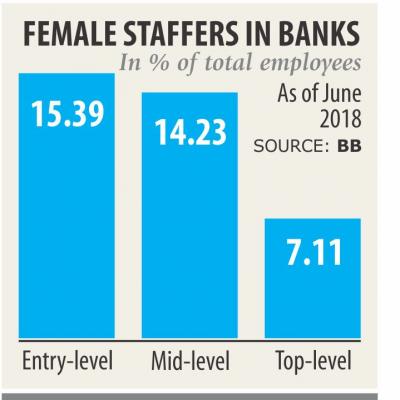Banks still a man's world

Iffat Jahan Dina landed a well-paying job in a private bank soon after obtaining her Masters degree from Rajshahi University. She dedicated herself to the job, which she found gratifying.
But the promising banking career ground to a halt once Dina's second child came along. “My husband, who is a businessman, does not have the time needed to share the child-rearing load with me,” she said.
She found herself spread too thin trying to excel as a banker, mother and homemaker at once. So, domesticity took precedence.
Dina's is not an isolated case. Like her, many capable female employees in the country's banking sector had to give up their jobs for homemaking responsibilities.
In June last year, 15.39 percent of the entry-level staff was female, but the percentages of mid- to high-level staff were 14.23 percent and 7.11 percent respectively, according to a survey carried out by the central bank.
This suggests a large number of female staff drop off the career ladder as time goes by.
A female employee starts to struggle at her job once she gives birth, as there is no available support to take care of the baby, said Nazneen Sultana, a former deputy governor of the central bank.
“A common concept in our society is that women are solely responsible for raising the child and doing the school runs. This creates problems in their professional lives,” she added.
It is not just family responsibilities that compel female staff to quit; the attitude of senior management is another factor, said Sadia Ara Jahan, an executive vice-president of a private bank.
“Many banks think that women are not fit for handling corporate clients and achieving the deposit target. So, they are not offered promotion on time, leaving them demoralised.”
The central bank had earlier instructed banks to let their female officials leave by 6pm to facilitate them to perform in their roles as homemakers too.
“But no one follows this rule,” Jahan said.
In many cases female staffers are made to sit in office past 6pm when there is no work to be done, according to Sultana.
The central bank's survey found that 28 banks have so far formulated policy on gender harassment and only 12 have organised awareness programmes on the issue.
The majority of the female employees tend to remain unmarried when they enter banks at the entry level, said Syed Mahbubur Rahman, chairman of the Association of Bankers, Bangladesh, a platform of private banks' chief executives.
“But over time they have to get married, which drives them out of jobs, even though they have the qualities and potential.”
Rahman, who is also the managing director of Dhaka Bank, acknowledged that the women-centric initiatives taken by banks thus far, such as the recent introduction of day care centres and transport facilities, are not enough to retain female staff.
The ratio of women staff, aged over 50 years, stood at 7.21 percent, much lower than the percentage of those below 30 -- 20.19 percent, showed the survey.
“Many women will be able to continue with their banking jobs if their family members and male colleagues are a little cooperative, understanding and empathetic,” said Sultana, also a member of the board of directors of the Palli Karma Sahayak Foundation.
Then, promising bankers like Dina would not be filled with desolation thinking about her future.
“My educational achievements were much better than many of my colleagues. But, they are for nothing now. I do not know how I will spend my time after eight to ten years when my children become independent,” the 34-year-old added.
